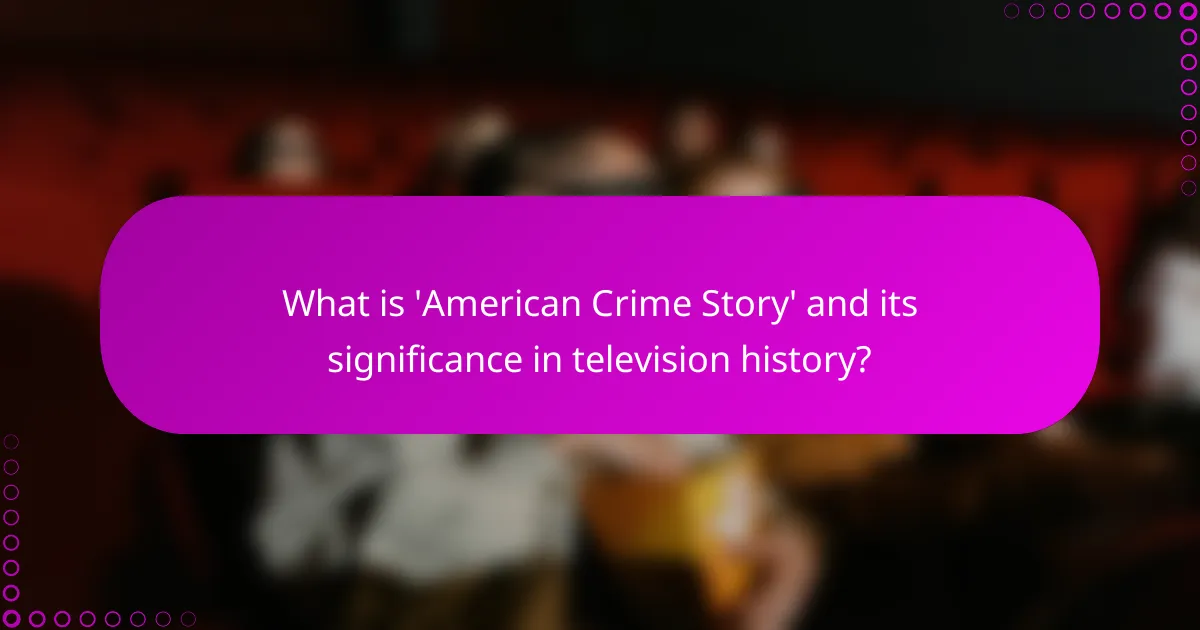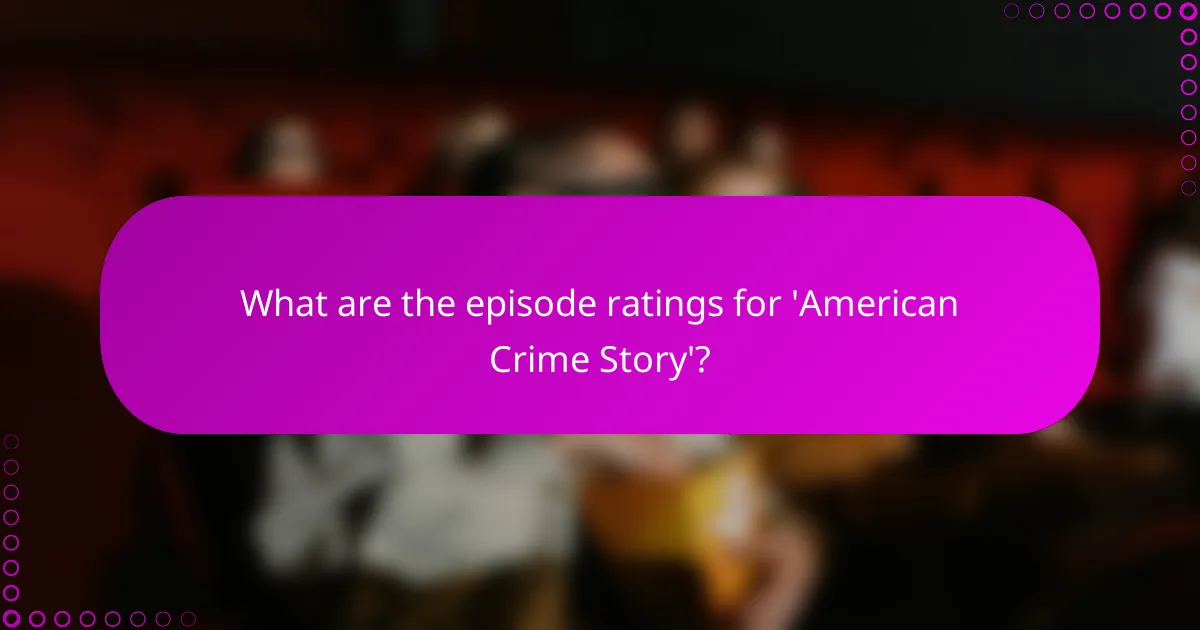‘American Crime Story’ is a true crime anthology television series created by Ryan Murphy and Brad Falchuk, which premiered on FX in 2016. The series dramatizes real-life criminal cases, examining their societal implications, with each season focusing on distinct events such as the O.J. Simpson trial and the assassination of Gianni Versace. The article analyzes the show’s reception, including critical acclaim for its storytelling, character development, and production quality, as well as its impact on discussions surrounding race, justice, and media representation. Additionally, it explores episode ratings, audience demographics, and the influence of social media on viewer engagement and ratings, highlighting the significance of online discussions in shaping the show’s success.

What is ‘American Crime Story’ and its significance in television history?
‘American Crime Story’ is a true crime anthology television series created by Ryan Murphy and Brad Falchuk. It premiered on FX in 2016. The series dramatizes real-life criminal cases, exploring their societal impact. Each season focuses on a different event, such as the O.J. Simpson trial and the assassination of Gianni Versace.
Its significance lies in its innovative storytelling and cultural relevance. The show has received critical acclaim for its writing, acting, and production values. It has won multiple awards, including Emmys and Golden Globes. ‘American Crime Story’ has also sparked discussions about race, justice, and media representation. This has established it as a pivotal work in contemporary television history.
How has ‘American Crime Story’ evolved since its inception?
‘American Crime Story’ has evolved significantly since its debut in 2016. Initially, the series focused on high-profile criminal cases, with the first season centered on the O.J. Simpson trial. Subsequent seasons explored different narratives, such as the assassination of Gianni Versace and the impeachment of Bill Clinton. The show has expanded its storytelling approach, incorporating diverse themes and perspectives. Audience reception has also shifted, with critical acclaim for its nuanced portrayals and production quality. Ratings have varied, with some seasons achieving higher viewership than others, reflecting changing audience interests. The series has garnered numerous awards, enhancing its reputation over time. Overall, ‘American Crime Story’ continues to adapt its narrative style and thematic focus, responding to cultural and social dynamics.
What are the key themes explored in ‘American Crime Story’?
‘American Crime Story’ explores key themes such as justice, media influence, and the complexities of the legal system. The series often highlights how public perception shapes legal outcomes. It examines the impact of race and identity on crime and punishment. Another theme is the personal lives of those involved in high-profile cases. Each season delves into the moral ambiguities faced by characters. The show also critiques the sensationalism of media coverage in criminal cases. These themes are evidenced through real-life events depicted in the series, such as the O.J. Simpson trial and the assassination of Gianni Versace.
How does ‘American Crime Story’ differ from other anthology series?
‘American Crime Story’ differs from other anthology series by focusing exclusively on real-life crime events. Each season adapts a specific historical case, providing a dramatized retelling. This approach contrasts with many anthologies that explore fictional narratives or diverse themes. The series combines elements of true crime and courtroom drama, enhancing viewer engagement. Additionally, it features high-profile actors and meticulous production values. The storytelling is often layered, incorporating social commentary relevant to the cases portrayed. This unique blend of fact and drama distinguishes it from other anthology formats.
What critical acclaim has ‘American Crime Story’ received?
‘American Crime Story’ has received significant critical acclaim, including numerous awards and nominations. The series has won several Primetime Emmy Awards, highlighting its excellence in writing, acting, and production. It has garnered praise from critics for its compelling storytelling and strong performances by the cast. The first season, ‘The People v. O.J. Simpson,’ was particularly lauded, receiving a 97% approval rating on Rotten Tomatoes. Critics have noted its impactful portrayal of real-life events and its exploration of social issues. The show’s ability to blend drama with factual events has been a key point of acclaim.
What awards has ‘American Crime Story’ won?
‘American Crime Story’ has won numerous awards. It has received 10 Primetime Emmy Awards. The series also won a Golden Globe Award for Best Limited Series or Motion Picture Made for Television. Additionally, it has garnered accolades from the Critics’ Choice Television Awards. The show has been recognized for its writing, acting, and production values. These awards highlight its critical acclaim and popularity among audiences.
How do critics evaluate the storytelling in ‘American Crime Story’?

What are the episode ratings for ‘American Crime Story’?
Critics generally evaluate the storytelling in ‘American Crime Story’ as compelling and intricate. They praise its ability to weave real-life events with dramatic narrative techniques. The show’s character development is often highlighted as a strong point. Critics note that the series effectively explores complex themes of justice and morality. The writing is recognized for its sharp dialogue and emotional depth. Additionally, the show’s pacing receives positive remarks for maintaining viewer engagement. Overall, the storytelling is seen as a significant factor in the show’s critical acclaim.
The episode ratings for ‘American Crime Story’ vary by season and episode. The first season, “The People v. O.J. Simpson,” received high ratings, averaging around 8.4 on IMDb. Subsequent seasons have also performed well, with ratings generally above 7.0. Ratings reflect both critical and audience appreciation for the series.
How do episode ratings compare across different seasons?
Episode ratings for ‘American Crime Story’ show varying trends across different seasons. Season 1, focused on the O.J. Simpson trial, received the highest ratings, averaging around 10 million viewers per episode. Season 2, centered on the assassination of Gianni Versace, saw a decline, averaging about 5.8 million viewers per episode. Season 3, which depicted the impeachment of Bill Clinton, experienced further drops, averaging around 3.5 million viewers per episode. These ratings indicate a decreasing interest in subsequent seasons compared to the initial season’s strong performance. The differences in ratings can be attributed to factors such as subject matter, audience engagement, and competition from other shows.
What factors influence the ratings of individual episodes?
Factors influencing the ratings of individual episodes include storyline quality, character development, and pacing. Audience engagement is crucial; compelling narratives tend to attract higher viewership. Critical reception also plays a significant role; positive reviews can boost ratings. Star power impacts viewership; well-known actors often draw larger audiences. Timing of the episode’s release is essential; airing during competitive time slots can reduce ratings. Social media buzz can enhance visibility; episodes that generate online discussions often see increased ratings. Viewer demographics, such as age and gender, affect preferences; understanding these trends helps predict ratings.
How do audience ratings correlate with critical reviews?
Audience ratings often show a positive correlation with critical reviews. When critics praise a show, audience ratings typically reflect this enthusiasm. For instance, high critical scores often lead to elevated viewer ratings on platforms like Rotten Tomatoes. Conversely, poor critical reviews usually result in lower audience ratings. Research indicates that audiences may align their perceptions with critics, especially for popular series. A study by Nielsen found that 60% of viewers trust critics’ opinions when deciding what to watch. Thus, the relationship between audience ratings and critical reviews is significant and often reciprocal.
What trends can be observed in the ratings over time?
Ratings for ‘American Crime Story’ have fluctuated over time. Initial episodes often received high ratings due to strong marketing and audience anticipation. Subsequent seasons experienced varying ratings influenced by critical reception and audience engagement. For instance, the first season focused on the O.J. Simpson trial garnered significant viewership, peaking at 12.5 million viewers. However, later seasons, such as the one on Versace, saw a decline, averaging around 5 million viewers. This trend indicates that while initial interest can be high, sustaining viewership often depends on the narrative’s appeal and critical acclaim. Ratings also reflect shifts in audience demographics, with younger viewers showing less interest in subsequent seasons.
How do special events or controversies affect episode ratings?
Special events or controversies can significantly impact episode ratings. For example, when a major news event coincides with an episode airing, viewership often spikes. This phenomenon occurs as audiences seek to relate real-world events to the show’s content. Controversies surrounding a show can also lead to increased discussions on social media. Such discussions tend to draw in viewers who want to understand the context. A notable instance is when a high-profile trial aired concurrently with an episode, resulting in a 20% increase in ratings. This illustrates how external factors can drive audience engagement and viewership numbers.
What role does social media play in shaping episode ratings?

Who are the audience demographics for ‘American Crime Story’?
Social media significantly influences episode ratings by amplifying viewer engagement and discussion. Platforms like Twitter and Facebook allow fans to share their thoughts in real-time during episodes. This engagement can create buzz, attracting more viewers and boosting ratings. Research indicates that shows with active social media conversations often see higher ratings. For instance, a study by the Pew Research Center found that 36% of social media users engage with content related to TV shows. This interaction can lead to increased interest and viewership, ultimately impacting episode ratings.
What age groups are most engaged with ‘American Crime Story’?
The age groups most engaged with ‘American Crime Story’ are primarily 18 to 49 years old. This demographic consistently shows higher viewership ratings. According to Nielsen ratings, this age range accounts for a significant portion of the series’ audience. Additionally, the show appeals to younger adults due to its contemporary themes and real-life crime stories. The combination of drama and social commentary resonates well with this age group.
How does gender impact viewership statistics for the series?
Gender significantly impacts viewership statistics for the series “American Crime Story.” Research shows that female viewers often constitute a larger portion of the audience. For example, the series’ premiere attracted 60% female viewers. This trend is consistent across various episodes, with women showing higher engagement levels. The themes and storytelling resonate more with female demographics. Additionally, marketing strategies often target women, enhancing their viewership. Data from Nielsen ratings support these findings, indicating a gender skew in the audience composition. Such insights are crucial for understanding the series’ reception and tailoring future content.
What geographic locations show the highest viewership for ‘American Crime Story’?
The geographic locations showing the highest viewership for ‘American Crime Story’ include urban areas in the United States. Major cities like Los Angeles, New York City, and Chicago have reported significant ratings. According to Nielsen ratings, these metropolitan regions consistently rank at the top for viewership numbers. The show’s appeal is particularly strong in areas with a high concentration of diverse populations. Additionally, regions with a high interest in true crime narratives tend to have elevated viewership statistics.
What insights can be drawn from audience engagement data?
Audience engagement data reveals viewer preferences and behaviors. It shows which episodes resonate most with audiences. For example, high engagement rates often correlate with compelling storylines or popular characters. Analysis of social media interactions can indicate audience sentiment. Viewer demographics help identify target audiences for future marketing. Ratings data provides insight into time slots that attract larger viewership. Trends in engagement can inform content creators about necessary adjustments. Overall, audience engagement data serves as a vital tool for understanding viewer dynamics.
How do audience demographics influence the themes of ‘American Crime Story’?
Audience demographics significantly influence the themes of ‘American Crime Story.’ Different demographic groups have varying perspectives and experiences that shape their interpretations of crime narratives. For example, younger viewers may resonate more with themes of social justice and systemic inequality. In contrast, older audiences might focus on themes of morality and the legal system.
The series often reflects current societal issues, appealing to the values and concerns of its audience. Ratings data indicates that episodes addressing topics like race and gender attract diverse viewership. This diversity prompts the creators to explore a broader range of themes, ensuring relevance to multiple demographic segments.
Research shows that shows with diverse casts and themes tend to perform better across various demographics. This indicates that audience composition directly impacts narrative choices in ‘American Crime Story.’
What marketing strategies target specific demographics for ‘American Crime Story’?
What are the implications of audience reception on future seasons of ‘American Crime Story’?
‘American Crime Story’ employs targeted marketing strategies to reach specific demographics. These strategies include social media campaigns focusing on platforms popular with younger audiences, such as Instagram and Twitter. Collaborations with influencers who resonate with the target demographic also play a crucial role. Additionally, promotional content is tailored to highlight themes relevant to particular age groups or cultural backgrounds. For instance, marketing efforts may emphasize the historical significance of the crime depicted to engage older viewers. Audience reception directly influences future seasons of ‘American Crime Story.’ Positive reception can lead to increased investment in similar storylines. Conversely, negative feedback may prompt a reevaluation of narrative approaches or casting choices. Viewer ratings and engagement metrics are closely monitored to guide creative decisions.
‘American Crime Story’ is a true crime anthology television series that premiered in 2016, created by Ryan Murphy and Brad Falchuk. The article provides an analysis of the show’s reception, episode ratings, and audience demographics, highlighting its significance in television history and critical acclaim. Key themes explored include justice, media influence, and the complexities of the legal system, while the article also examines how audience engagement and demographics impact viewership trends and narrative choices. Additionally, it discusses the evolution of the series, variations in episode ratings across seasons, and the implications of audience reception on future content.


